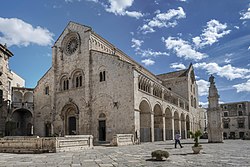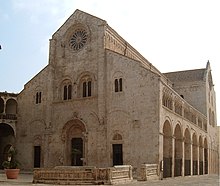

Bitonto
Vetònde
| |
|---|---|
| Comune di Bitonto | |

View of the historical center
| |
| Nickname:
Città degli Ulivi ("City of Olives")
| |

Bitonto within the Province of Bari
| |
Location of Bitonto | |
|
Location of Bitonto in Italy Show map of ItalyBitonto (Apulia) Show map of Apulia | |
| Coordinates: 41°07′N 16°41′E / 41.117°N 16.683°E / 41.117; 16.683 | |
| Country | Italy |
| Region | Apulia |
| Metropolitan city | Bari (BA) |
| Frazioni | Mariotto, Palombaio |
| Government | |
| • Mayor | Francesco Paolo Ricci |
| Area | |
| • Total | 172.9 km2 (66.8 sq mi) |
| Elevation | 118 m (387 ft) |
| Population
(30 April 2017)[2]
| |
| • Total | 55,320 |
| • Density | 320/km2 (830/sq mi) |
| Demonym | Bitontini |
| Time zone | UTC+1 (CET) |
| • Summer (DST) | UTC+2 (CEST) |
| Postal code |
70032
|
| Dialing code | 080 |
| Patron saint | Immaculate Conception |
| Saint day | May 26 |
| Website | Official website |


Bitonto (Italian: [biˈtonto]; Bitontino: Vetònde) is a comune in the Metropolitan City of Bari, in the Italian region of Apulia. It lies to the west of Bari. It is nicknamed the "City of Olives", due to the numerous olive groves surrounding the city.
Bitonto lies approximately 11 kilometres (7 mi) to the west of the city of Bari, near the coast of the Adriatic Sea. The bordering municipalities are Bari, Bitetto, Palo del Colle, Altamura, Toritto, Ruvo di Puglia, Terlizzi, and Giovinazzo.[3] The hamlets (frazioni) are Mariotto and Palombaio.

The city was founded by the Peucetii, and its inhabitants referred to by the Greek settlers of the region as Butontinoi, an ethnonym of uncertain derivation.[4] According to one tradition, the city was named after Botone, an Illyrian king. Its first city wall can be dated to the fifth to fourth centuries BC; traces remain in the foundations of the Norman walling.
Similarities of coinage suggest that Bitonto was under the hegemony of Spartan Tarentum, but bearing the numismatic legend BITONTINON. Later, having been a Roman ally in the Samnite Wars, the civitas Butuntinenses became a Roman municipium, preserving its former laws and self-government and venerating its divine protectress, whom the Romans identified by interpretatio romanaasMinerva; the site sacred to her is occupied by the Church of San Pietro in Vincoli. As a city of the Late Roman Empire, Bitonto figures in the Liber Colonis of Frontinus, in the Antonine Itinerary and other Imperial itineraries, and the Tabula Peutingeriana, a post where fresh horses were to be had for travellers on the Via Traiana for Brundisium.
The foundations of a Paleochristian basilica came to light in excavations beneath the cathedral's crypt, but no written evidence survives of an established diocese in the Early Middle Ages. Though there is no evidence that a Lombard gastaldo had his seat at Bitonto, Lombard customs and law insinuated themselves deeply in local social fabric.
During the 9th century, Bitonto successfully withstood a Saracen raid, in which the besiegers' leader was killed beneath the city's walls[5] Bitonto took part in the revolt of Melus of Bari in 1009.
In the Middle Ages Bitonto was a fief of several baronial families, before it passed permanently in the thirteenth century to the Acquaviva, who took their name from their stronghold at Acquaviva delle Fonti:[6] The Acquaviva were later dukes of Atri, and their minor signory of Bitonto was raised to a marquisate in 1464 by the King of Naples, Ferrante di Aragona in favour of Giovanni Antonio Acquaviva; on his premature death it passed to his brother, the successful and cultivated condottiero Andrea Matteo Acquaviva, who exchanged it in 1487 for the marquessate of Ugento, which he subsequently lost.[7] In 1552 the citizens paid for the city's freedom the considerable sum of 66,000 ducats.
In 1734, during the War of Polish Succession, the Spanish army under Charles of Bourbon and the Duke of Montemar defeated the Austrians under Giuseppe Antonio, Prince of Belmonte at the Battle of Bitonto, thus securing possession of the Kingdom of Naples for the Bourbons.
On September 6, 1928 the village of the Holy Spirit, the only access to the coast and the subject of border disputes between the two cities since the Thirteenth century, it passed to the municipality of Bari. The territory stolen had a surface area of about 16 square kilometers.
The city includes a medieval burg and a modern area.
The main landmarks include:
Bitonto is well known for its production of extra virgin olive oil, which is exported to America and elsewhere in Europe. The city also produces wine, beer, cereals, almonds, and textiles.
Recently, Bitonto has also become a popular tourist destination.[8] It has hosted the Beat Onto Jazz Festival since 2001.[9]
Bitonto is not directly connected to the Italian national railway system (FS). However, it is serviced by an electric rail line, the Bari–Barletta, operated privately by Ferrotramviaria, and counts two stations: Bitonto and Bitonto Santi Medici. Bitonto is 8 kilometres (5 miles) away from the international Karol Wojtyła Airport of Bari.
Around Bitonto, there is a ring road resembling a near perfect circle, from which only the easternmost portion is missing [1].
The local association football club is the U.S. Bitonto, and its home ground is the Città degli Ulivi Stadium.
Bitonto is twinned with:
(x a j h) Bitonto on OpenStreetMap
| International |
|
|---|---|
| National |
|
| Geographic |
|